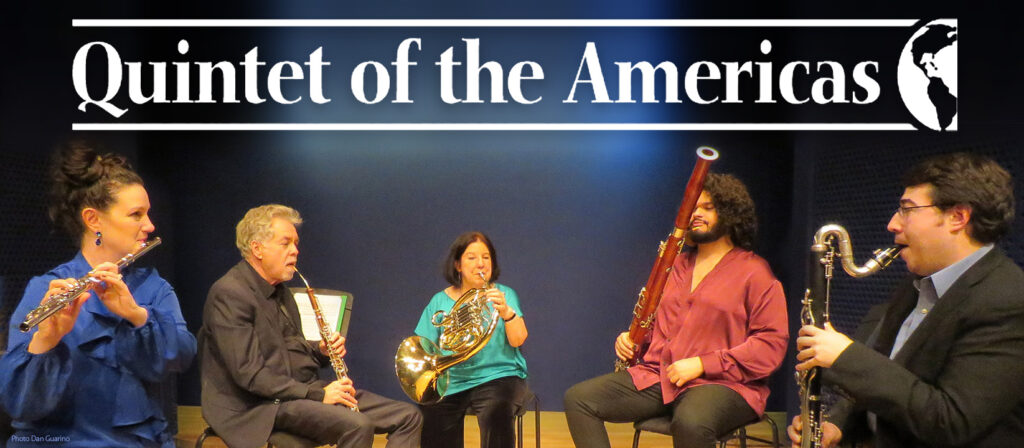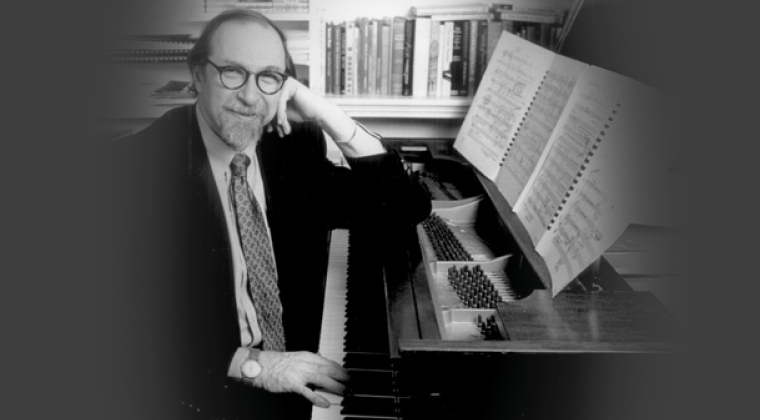Bird Bath (2001)
The composer writes “Bird Bath was composed for the Quintet of the Americas, and premiered by them at the Bar Harbor Music Festival in 2001. The work attempts to highlight elements of woodwind timbre (and characteristic figurations) which suggest bird calls. In addition, I’ve placed the quintet members within a larger environment – mostly electronic — teeming with other “birds.” Three compact disks, interacting with the quintet members (and often overlapping each other as well), are used during the performance. Much of the time the CD material consists of actual bird calls, as recorded by ornithologists. But at other times one can hear fragments from the literature of Western art music in which birds are represented — the Beethoven Pastorale symphony, for example, or the William Tell Overture — and passages from the two great “Bird” composers, William and Charlie. The listener might want to approach Bird Bath, in fact, as the aural equivalent of a forest, within which (1) various events emerge and recede, and (2) one’s initial perception of a dense, multi-tiered landscape gradually sharpens in focus, revealing individual objects and relationships.”
Elliott Schwartz (1936-2016), a graduate of Columbia University where he studied composition with Otto Luening and Jack Beeson. He was the Robert K. Beckwith Professor of music at Bowdoin College, where he taught from 1964 to 2007. He also held extended visiting residencies at the University of California (Santa Barbara and San Diego), Ohio State University, Harvard University, the London College of Music, Cambridge University (UK) and Trinity College of Music (UK). Schwartz served as national chair of the SCI, president of the College Music Society, and vice-president of the American Music Center. Performances of Schwartz’s music include the Minnesota Orchestra, Cincinnati Symphony, Milwaukee Symphony, St Paul Chamber Orchestra, Tanglewood, the Library of Congress, Monday Evening Concerts (Los Angeles), De Ijsbreker (Amsterdam) and conservatories in Boston, Tokyo, Weimar and Reykjavik. Recordings of his music can be heard on the New World, CRI, Capstone, Albany and Innova labels.
In addition to his composing, Schwartz also wrote a number of books, critical essays, and reviews. He was a pioneer of electronic music in America and his books include Electronic Music: A Listener’s Guide, Music Since 1945 co-authored with Daniel Godfrey, and the anthology, Contemporary Composers on Contemporary Music co-edited with Barney Childs.
Elliott Schwartz also wrote Rows Garden for woodwind quintet. He wrote about it,
“For each of the five movements of Rows Garden, I have drawn my musical material form a well-known tone row by one of the composers of the Second Viennese School. (In fact, Rows Garden originally had a subtitle: ‘New Views of Old Sets.’) These particular rows are familiar to musicians everywhere. Quite apart from the respective works with which they’re associated, the rows are often studied as veritable icons – miniature art works – in their own right. It seemed perfectly legitimate, therefore, to treat them as though they were ‘themes’ subject to ‘variation.’ The fact that my approach to such rows usually makes them sound rather tonal (and, I suspect, American as well!) has given me a kind of perverse satisfaction.
In my opinion, the listener does not have to know the original materials – either the tone rows by Schoenberg, Berg, and Webern, or the works in which they appear – to understand or enjoy my suite of five brief vignettes. But for the record, the tone-row ‘sources’ are (in order) the Berg Lyric Suite, Webern Concerto (op. 24), Schoenberg Variations for Orchestra, Webern Variations (op. 30), and Berg Violin Concerto.”
For more information see https://www.wisemusicclassical.com/composer/2320/Elliott-Schwartz/

